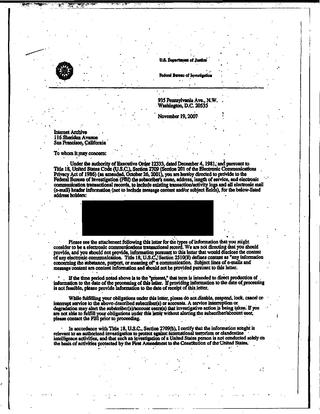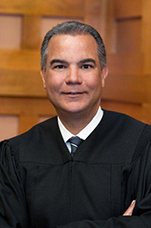
The Federal Bureau of Investigation (FBI) is the domestic intelligence and security service of the United States and its principal federal law enforcement agency. An agency of the United States Department of Justice, the FBI is a member of the U.S. Intelligence Community and reports to both the Attorney General and the Director of National Intelligence. A leading U.S. counterterrorism, counterintelligence, and criminal investigative organization, the FBI has jurisdiction over violations of more than 200 categories of federal crimes.
The Electronic Privacy Information Center (EPIC) is an independent nonprofit research center established in 1994 to protect privacy, freedom of expression, and democratic values in the information age. Based in Washington, D.C., their mission is to "secure the fundamental right to privacy in the digital age for all people through advocacy, research, and litigation." EPIC believes that privacy is a fundamental right, the internet belongs to people who use it, and there's a responsible way to use technology.

The Freedom of Information Act, 5 U.S.C. § 552, is the United States federal freedom of information law that requires the full or partial disclosure of previously unreleased or uncirculated information and documents controlled by the U.S. government upon request. The act defines agency records subject to disclosure, outlines mandatory disclosure procedures, and includes nine exemptions that define categories of information not subject to disclosure. The act was intended to make U.S. government agencies' functions more transparent so that the American public could more easily identify problems in government functioning and put pressure on Congress, agency officials, and the president to address them. The FOIA has been changed repeatedly by both the legislative and executive branches.

A Joint Terrorism Task Force (JTTF) is an American locally-based multi-agency partnership between various federal, state, and local law enforcement agencies tasked with investigating terrorism and terrorism-related crimes, led by the Federal Bureau of Investigation and U.S. Department of Justice. The first JTTFs were established before the September 11 attacks, with their numbers increasing dramatically in the years after.
Judicial Watch (JW) is a 501(c)(3) nonprofit American conservative activist group that files Freedom of Information Act (FOIA) lawsuits to investigate claimed misconduct by government officials. Founded in 1994, Judicial Watch has primarily targeted Democrats, in particular the administrations of Bill Clinton and Barack Obama, as well as Hillary Clinton's role in them. It was founded by attorney Larry Klayman, and has been led by Tom Fitton since 2003.

The National Security Archive is a 501(c)(3) non-governmental, non-profit research and archival institution located on the campus of the George Washington University in Washington, D.C. Founded in 1985 to check rising government secrecy. The National Security Archive is an investigative journalism center, open government advocate, international affairs research institute, and the largest repository of declassified U.S. documents outside the federal government. The National Security Archive has spurred the declassification of more than 15 million pages of government documents by being the leading non-profit user of the U.S. Freedom of Information Act (FOIA), filing a total of more than 70,000 FOIA and declassification requests in its over 35+ years of history.
Animal Outlook, formerly known as Compassion Over Killing (COK), is a nonprofit animal advocacy organization based in Washington, D.C. It is headed since May 2021 by Executive Director Cheryl Leahy, who succeeded Erica Meier. Formed in 1995, as a high school club, their primary campaigns are to advocate against factory farming and promote vegan eating. While the group welcomes those who are interested in animal welfare who eat meat, it encourages a transition to a plant-based diet.

The following are controversial invocations of the USA PATRIOT Act. The stated purpose of the Act is to "deter and punish terrorist acts in the United States and around the world, to enhance law enforcement investigatory tools, and for other purposes." One criticism of the Act is that "other purposes" often includes the detection and prosecution of non-terrorist alleged future crimes.
The Reporters Committee for Freedom of the Press(RCFP) is a nonprofit organization based in Washington, D.C., that provides pro bono legal services and resources to and on behalf of journalists. The organization pursues litigation, offers direct representation, submits amicus curiae briefs, and provides other legal assistance on matters involving the First Amendment, press freedom, freedom of information, and court access issues.

A national security letter (NSL) is an administrative subpoena issued by the United States government to gather information for national security purposes. NSLs do not require prior approval from a judge. The Stored Communications Act, Fair Credit Reporting Act, and Right to Financial Privacy Act authorize the United States government to seek such information that is "relevant" to an authorized national security investigation. By law, NSLs can request only non-content information, for example, transactional records and phone numbers dialed, but never the content of telephone calls or e-mails.

The Animal Legal Defense Fund is an American animal law advocacy organization. Its stated mission is to protect the lives and advance the interests of animals through the legal system. It accomplishes this by filing high-impact lawsuits to protect animals from harm, providing free legal assistance and training to prosecutors to assure that animal abusers are punished for their crimes, supporting tough animal protection legislation and fighting legislation harmful to animals, and providing resources and opportunities to law students and professionals to advance the emerging field of animal law. In addition to their national headquarters in Cotati, California, the Animal Legal Defense Fund maintains an office in Portland, Oregon.

Farm Sanctuary is an American animal protection organization, founded in 1986 as an advocate for farmed animals. It was America's first shelter for farmed animals. It promotes laws and policies that support animal welfare, animal protection, and veganism through rescue, education, and advocacy. Farm Sanctuary houses over 800 cows, chickens, ducks, geese, turkeys, pigs, sheep, and goats at a 300+ acre animal sanctuary in Watkins Glen, New York, and more than 100 animals at its location in Acton, California, near Los Angeles.

The Animal Enterprise Terrorism Act (AETA) of 2006 is a United States federal law that prohibits any person from engaging in certain conduct "for the purpose of damaging or interfering with the operations of an animal enterprise." The statute covers any act that either "damages or causes the loss of any real or personal property" or "places a person in reasonable fear" of injury.
Investigative Data Warehouse (IDW) is a searchable database operated by the FBI. It was created in 2004. Much of the nature and scope of the database is classified. The database is a centralization of multiple federal and state databases, including criminal records from various law enforcement agencies, the U.S. Department of the Treasury's Financial Crimes Enforcement Network (FinCEN), and public records databases. According to Michael Morehart's testimony before the House Committee on Financial Services in 2006, the "IDW is a centralized, web-enabled, closed system repository for intelligence and investigative data. This system, maintained by the FBI, allows appropriately trained and authorized personnel throughout the country to query for information of relevance to investigative and intelligence matters."
The UNROW Human Rights Impact Litigation Clinic is a student litigation and advocacy project at American University's Washington College of Law.

The production of foie gras involves the controversial force-feeding of birds with more food than they would eat in the wild, and more than they would voluntarily eat domestically. The feed, usually corn boiled with fat, deposits large amounts of fat in the liver, thereby producing the fatty consistency sought by some gastronomes.

EPIC v. Department of Justice is a 2014 case in the United States District Court for the District of Columbia between the Electronic Privacy Information Center (EPIC) and the U.S. Department of Justice (DOJ) where EPIC seeks court action to enforce their Freedom of Information Act request for documents that the Department of Justice has withheld pertaining to George W. Bush's authorization of NSA warrantless surveillance.
The California foie gras law or Senate Bill 1520 is a California State statute that prohibits the "force feed[ing of] a bird for the purpose of enlarging the bird's liver beyond normal size" as well as the sale of products that are a result of this process (§ 25982). This outlawed the traditional method of producing foie gras in California. The law was enacted in 2004 and went into effect on July 1, 2012. The law has been challenged repeatedly since its enactment. The ninth circuit in 2022 upheld a lower court’s 2020 ruling, which allowed residents to purchase foie gras for their individual use from out-of-state retailers.

Christopher Reid "Casey" Cooper is an American lawyer who serves as a United States district judge of the United States District Court for the District of Columbia.
Federal Bureau of Investigation v. Fazaga, 595 U.S. ___ (2022), was a United States Supreme Court case dealing with the use of law enforcement surveillance under the Foreign Intelligence Surveillance Act of 1978 (FISA) and the state secrets privilege defense. The case stems from a 2011 class action lawsuit filed against the Federal Bureau of Investigation (FBI) related to one of its surveillance operations. In August 2012, the district court dismissed the case on the basis of the FBI's invocation of state secrets privilege. The Ninth Circuit overturned this ruling in part in 2019, ruling that FISA precluded the defendants from invoking the state secrets defense. However, the Supreme Court overturned the Ninth Circuit’s ruling in a unanimous decision in March 2022, stating that FISA does not override the state secrets defense.










